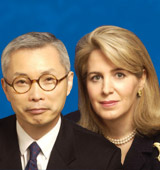In the second half of our
book, we focus on what it takes to
implement a strategic shift by
introducing the principles of Tipping
Point Leadership and Fair Process.
Both are essential to strategy making
and execution by overcoming key
organizational hurdles and
mobilizing people for the voluntary
cooperation needed to execute blue
ocean strategy.
Tipping Point Leadership ensures that
leaders are able to overcome the four
key organizational hurdles to strategy
execution. The first hurdle is
cognitive: waking employees up to
the need for a strategic shift. Red
oceans may not be the paths to future
profitable growth, but they feel
comfortable to people and may have
even served an organization well in
the past. This leads managers to ask,
why shake things up? The second
hurdle is limited resources. Most
managers assume that the greater the
shift in strategy, the greater the
resources needed to execute it. In
reality, by leveraging the people, acts,
and activities with a disproportionate
influence on performance can make
changes happen quickly and at low
cost. Third hurdle is motivational.
How do you motivate key players to
move fast and tenaciously to carry out
a break fromthe status quo? The final
hurdle is political. As we all know,
organizational politics is a fact of
corporate and public sector life. The
question is: how do you identify and
silence internal opponents who resist
change because of their strong vested
interests in the status quo? As
outlined in our book, Tipping Point
Leadership allows you to overcome
these four key organizational hurdles
fast and at low cost while winning
employees backing in executing a
break from the status quo.
Fair process ensures that individuals
go beyond the call of duty, exert
energy and initiative to the best of
their abilities to execute resulting
strategies. We have found that there are
three mutually reinforcing elements
that define fair process engagement,
explanation, and expectation clarity.
Engagement means involving
individuals in the strategic decisions that affect them by asking for their
input and allowing them to refute the
merits of one anothers ideas and
assumptions. Engagement
communicatesmanagements respect
for individuals and their ideas
resulting in better strategic decisions
by management and greater
commitment from all involved to
execute those decisions. Explanation
means that everyone involved and
affected should understand why final
strategic decisions are made as they
are. Moreover, explanation allows
employees to trust managers
intentions even if their own ideas
have been rejected. It also serves as a
powerful feedback loop that
enhances learning. Expectation
clarity requires that after a strategy is
set, managers state clearly the new
rules of the game. When people
clearly understand what is expected
of them, political jockeying and
favoritism are minimized, and people
can focus on executing the strategy
rapidly.
Consider what happens when
companies do not work with
employees to find ways of defusing
the threats so that everyone in the
company wins, despite shifts in
peoples roles, responsibilities, and
rewards. When Merrill Lynch
announced plans to create an online
brokerage service, its stock price fell
by 14% as reports emerged of
resistance and infighting within the
companys large retail brokerage
division. In contrast, Morgan Stanley
DeanWitter & Co. engaged employees
in an open internal discussion of the
companys strategy for meeting the
challenge of the Internet. Morgans
efforts paid off handsomely. Since the
market realized that its employees
understood the need for an eventure,
the companys shares rose 13% when
it eventually announced the venture.
Blue ocean strategy provides the tools
and methodologies for not only
excellent strategy content formulation but also for building execution into
this process to greatly increase a
companys chances of excellent
strategy execution as well.
